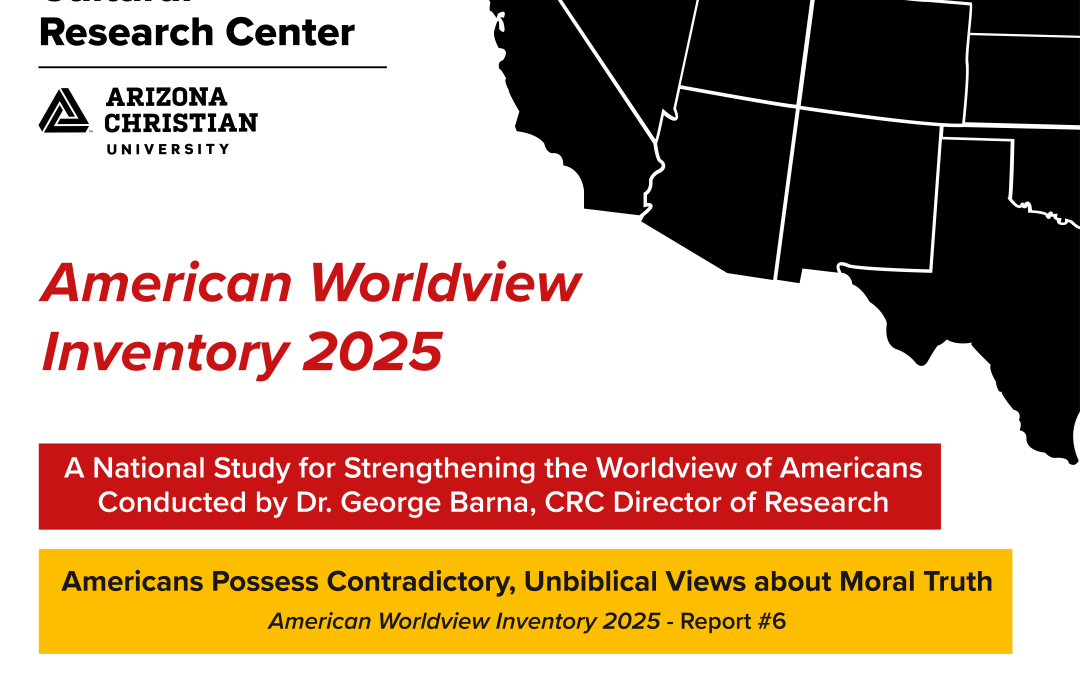From the Cultural Research Center at Arizona Christian University
GLENDALE, AZ (May 15, 2025) — A new national study shows that most Americans no longer believe in absolute moral truth, and instead rely on feelings and cultural norms to make moral decisions.
This shift in belief has resulted in most Americans holding “contradictory and unbiblical views about moral truth,” according to the latest report from the American Worldview Inventory 2025, an annual survey from the Cultural Research Center at Arizona Christian University.
The report from veteran researcher Dr. George Barna found that 74% of adults trust feelings over facts to discern moral truth, two-thirds reject absolute moral truth, and nine out of 10 embrace Syncretism—a blending of competing worldviews.
Even substantial majorities of some of the largest Christian church groups reject absolute morality, signaling a deep cultural shift away from biblical principles. For example, 69% of Catholics and 61% of those who attend a mainline Protestant church reject the idea of absolute moral truth.
Beyond that, the study found that half of theologically-identified born-again Christians—adults considered spiritually conservative and a cornerstone of evangelical Christianity—admit to rejecting absolute moral truth.
According to Barna, CRC Director of Research, the findings raise significant concerns about the long-term implications of this shift in belief for the nation’s moral and spiritual foundations.
“Accepting all truths as equally valid cannot help but dig a deep foundation of chaos, confusion, and helplessness,” Barna explained.
An earlier report from the AWVI 2025 noted that two out of three American adults currently reject or doubt the existence of absolute moral truth. This new report shows that this trend is especially pronounced among younger adults and minority populations, but is also widespread within Christian communities.
Perhaps most concerning, the report highlights that parents of children under age 13 are among the most likely to reject absolute moral truth—a trend that raises red flags about how the next generation will be shaped morally and spiritually.
As Americans increasingly reject moral truth, the leading source for moral guidance is their feelings. A full 74% of adults say they trust their emotional response to determine right from wrong. By comparison, only 44% consult the Bible, and even fewer rely on laws and public policies (41%), scientific or mathematical reasoning (40%), or cultural traditions (39%), the study found.
The report also shows widespread belief in moral pluralism—the idea that multiple, even contradictory, moral viewpoints can all be true. Fifty-eight percent of adults agree with that assertion, including 56% of Christians and 64% of those from non-Christian faiths.
Even one-quarter (23%) of Integrated Disciples—individuals who have a consistent biblical worldview—accept the “all-truth-views-are-right” mindset. As confounding as that is, the study also found that this view is twice as common among theologically-identified born-again Christians (47%) and people who attend evangelical churches (44%).
The AWVI 2025 study probed the reasons behind these views on moral truth. About half of all adults (45%) believe that changing moral standards over time and across cultures proves that absolute moral truth does not exist. Forty-four percent argue that because religious groups differ on moral teachings, there can be no single, objective truth. And 33% believe moral truth is simply a social construct, shaped by cultural experiences rather than grounded in reality.
Even behavior reflects this shift. One-third (33%) of adults surveyed believe that telling a lie to protect one’s personal interests or reputation is morally acceptable. That belief cuts across most religious groups, though it drops sharply among the small minority of Americans (4%) known as Integrated Disciples.
Barna warns that this erosion of moral clarity has serious cultural implications. “It is impossible to separate America’s core values—such as honesty, respect, service, responsibility, trustworthiness—from beliefs about moral truth,” he said. “These are all outgrowths of the increasing belief that there are no absolute moral truths that bind us together and should shape our life choices for both personal and communal benefit.”
The findings are part of the American Worldview Inventory 2025: A National Study for Strengthening the Worldview of Americans from Dr. George Barna, designed to examine concerning trends in American beliefs about God, truth, sin, and salvation. It seeks to understand why these key aspects of American faith are weak and to provide practical insights for rebuilding a strong biblical worldview in our nation.
The full report, “Americans Possess Contradictory and Unbiblical Views about Moral Truth,” and additional reports from the American Worldview Inventory 2025 are available here or by visiting www.CulturalResearchCenter.com.

